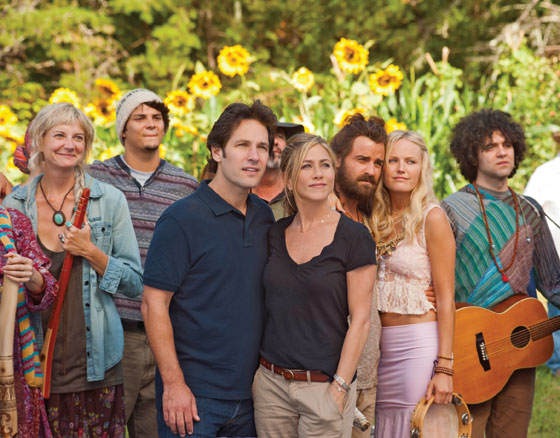
In the exuberant comedy Wanderlust, unemployed Manhattan couple George (Paul Rudd) and Linda (Jennifer Aniston) stumble into a hippie-dippie hallucinogen-imbibing farming commune with free love and no doors, even on bathrooms. It’s not fresh terrain for satire, yet most of the jokes play riotously well. In part that’s because, deep down, many of us still embrace the fantasy of freeing ourselves from the oppressive social network and crushing fear of job loss by becoming flower children, working the land, and gazing on long-haired girls in tie-dyed dresses atop white steeds while affable, hairy men strum guitars and offer weed: It’s the great American (hash) pipe dream. But Wanderlust mostly works because of another kind of collective: marvelous clowns who groove on the chance to turn Utopia dystopian.
Director David Wain, who wrote the script with Ken Marino, sticks to two comic principles: The lewd subtext must never stay sub- but be blurted out at the first, most appalling opportunity, and the joke must be extended for many beats longer than expected. This means we watch George, the straight-arrow naïf, labor to remain amiable in the face of outlandish boho declarations—that money literally, not metaphorically, buys nothing (literally); that monogamy is picking a fight with your body’s “sexual chi,” driving it inward and bringing death—while his unseen sphincter clenches and unclenches. Rudd might not be the subtlest straight man in movies, but, as of this moment, he’s the best. His tremulous deadpan makes him a good foil for Aniston, who mugs and overworks her mushy smile, but whose mugging mushiness works beautifully for the overeager Linda.
The zanies of Wanderlust include Kerri Kenney-Silver as a blissed-out motormouth, flowing redhead Lauren Ambrose as an imminent mother mystically buoyed by her swollen belly, and formidably rubber-faced Kathryn Hahn as a Cassandra whose feelers are scarily sensitive to bad vibes. Alan Alda continues his triumphantly cranky post-leading-man career as the commune’s last remaining founder, who fulminates against capitalism from his wheelchair. Looming largest is Justin Theroux as a woolly-bearded, mellow manly man who mentally undresses Linda on first sight. Wanderlust, from the Judd Apatow factory, has a lame coda and lamer outtakes over the closing credits. But by that point, nothing can bust its groove.
Iranian director Jafar Panahi’s This Is Not a Film is an extraordinary film, and one of the few in which boredom in the face of static camerawork and lack of narrative adds to the emotional wallop. The Iranian government has forbidden Panahi—who supported the opposition party—to make films for twenty years, six of which he might spend in prison. This not-a-film, set in his sumptuous apartment and shot by his friend Mojtaba Mirtahmasb (it was smuggled out of Iran in a cake in time for last year’s Cannes festival), is a brief but grueling chronicle of his impotence—as well as his compulsion to make cinema even when doing so imperils him and people he loves.
Panahi talks on the phone with his lawyer. He attempts to act out the movie he was poised to make, centering on a girl who wants to attend college but is locked in a room by her parents. He details camera moves, reads some lines, and then stops, forcing back tears. He has a smoke on his terrace and watches nearby construction cranes, then returns to say, “If I could tell a film, then why make a film?” While his pet iguana climbs the walls, Panahi plays DVDs of his other films to show where an actor’s instincts took over or the location, he says, became the director. Now he has no actors, no locations that interest him. Outside, Iranians set off fireworks for the New Year in defiance of the government: distant pops, sirens, the sounds of a mob. Inside, Panahi interviews a friendly but reticent custodian who comes to pick up the trash, and the not-a-film fades out as the young man heads into the eventful night. In totalitarian societies, artists have found all sorts of ways—some brilliantly imaginative—to disguise their political protest, but Panahi has no subterfuges left. This Is Not a Film ends with a whimper that is a bang. He must be freed.
Wanderlust
Directed by David Wain. R.
This Is Not a Film
Directed by Jafar Panahi. NR.
E-mail: [email protected].
